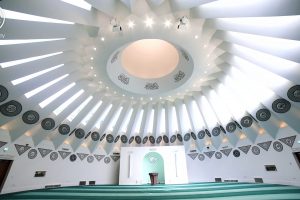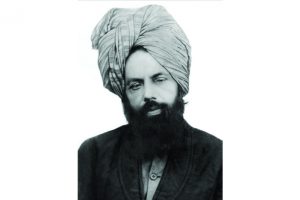
In the Mubarak Mosque in Islamabad, Tilford, His Holiness Hazrat Mirza Masroor Ahmad (aba) envisioned having the attributes of Allah on its walls so people could reflect deeper on God’s existence. His Holiness (aba) guided minutely on all aspects of design and implementation.
This series delves deeper into each of God’s attributes to gain a better understanding of His Being.
The calligraphy was designed by Razwan Baig, while The Review of Religions were given the opportunity to manage the project and produce each piece. Research for this series was compiled by Syed Mubashar Ayyaz (Research Cell) and translated into English by Shahzad Ahmed, Zafir Mahmood Malik and Nooruddeen Jahangeer Khan.
95. The Exalter (Al-Rāfi‘)

إِذۡ قَالَ ٱللهُ يَٰعِيسَىٰٓ إِنِّي مُتَوَفِّيكَ وَرَافِعُكَ إِلَيَّ وَمُطَهِّرُكَ مِنَ ٱلَّذِينَ كَفَرُواْ وَجَاعِلُ ٱلَّذِينَ ٱتَّبَعُوكَ فَوۡقَ ٱلَّذِينَ كَفَرُوٓاْ إِلَىٰ يَوۡمِ ٱلۡقِيَٰمَةِۖ ثُمَّ إِلَيَّ مَرۡجِعُكُمۡ فَأَحۡكُمُ بَيۡنَكُمۡ فِيمَا كُنتُمۡ فِيهِ تَخۡتَلِفُونَ
‘When Allah said, ‘O Jesus, I will cause thee to die a natural death and will exalt thee to Myself, and will clear thee from the charges of those who disbelieve, and will place those who follow thee above those who disbelieve, until the Day of Resurrection; then to Me shall be your return, and I will judge between you concerning that wherein you differ.” [1]
The attribute of الرَّافِع (Al-Rāfi‘) is derived from the root رَفَعَ ـ یَرْفَعُ (ra-fa-‘a – yar-fa-‘u) and has many meanings. According to the Arabic lexicon ‘Aqrab al-Mawarid, رَفَعَ means he raised up raise up or elevated and is the opposite of وَضَعَ (wa-ḍa-‘a) which means he placed down or debased.
The word رَفَعَ has been used in various connotations in the Holy Qur’an. It can mean to raise a building as it is used in the verse:
وَإِذۡ يَرۡفَعُ إِبۡرَٰهِـۧمُ ٱلۡقَوَاعِدَ مِنَ ٱلۡبَيۡتِ وَإِسۡمَٰعِيلُ
‘And remember the time when Abraham and Ishmael raised the foundations of the House.’ [2]
It can also mean to praise or honour someone or something. For example:
وَرَفَعۡنَا لَكَ ذِكۡرَكَ
‘And We exalted thy name,’[3]
Another connotation of this word is to exalt or elevate someone in rank. For example:
تِلۡكَ ٱلرُّسُلُ فَضَّلۡنَا بَعۡضَهُمۡ عَلَىٰ بَعۡضٖۘ مِّنۡهُم مَّن كَلَّمَ ٱللهُ وَرَفَعَ بَعۡضَهُمۡ دَرَجَٰتٖۚ
‘These Messengers have We exalted, some of them above others: among them there are those to whom Allah spoke; and some of them He exalted by degrees of rank.’ [4]
According to Edward Lane’s Arabic lexicon, الرَّافِع is an active participle and is one of the names of God, meaning ‘The Exalter’ of the believer by prospering [him], and of his saints by teaching [them]. [5]
Thus, when the word رَفَعَ is used for man in the connotation of being raised to God or if God is the active participle and man is the object in a sentence, then this invariably means spiritual exaltation as opposed to being raised physically. This is because God is not a material being that is confined to a limited place, as God Almighty Himself says in the Holy Qur’an that ‘We are nearer to him than even his jugular vein.’ [6] For if the word رَفَعَ meant bodily ascension to the heavens, then that would mean that Prophet Enoch (as) was also raised bodily, as regarding him, God Almighty states:
وَٱذۡكُرۡ فِي ٱلۡكِتَٰبِ إِدۡرِيسَ إِنَّهُ ۥ ج كَانَ صِدِّيقٗا نَّبِيًّا * وَرَفَعۡنَٰهُ مَكَانًا عَلِيًّا
‘And relate the story of Idris [Prophet Enoch] as mentioned in the Book. He was a truthful man and a Prophet. And We exalted him to a lofty station.’ [7]
Therefore, the possibility of Jesus (as) ascending physically to the heavens is not only impossible, but also contrary to the lexical connotations of this word. Jesus (as) himself has denied the possibility of his rising physically to the heaven. He says: ‘And no man hath ascended up to heaven, but He that came down from Heaven, even the Son of Man who is in Heaven.’ [8]
Similarly, there are various traditions of the Holy Prophet (sa) in which this word has been used and it means spiritual exaltation. Hazrat Abu Hurairah (ra) narrates that the Messenger of Allah (sa) said: ‘Charity does not decrease one’s wealth. No one forgives another except that Allah increases his honour, and no one humbles himself for the sake of Allah except that Allah elevates his status.’ [9]
The Honourable Status of Jesus (as)
Explaining the exalted status of Jesus (as), the Promised Messiah (as) states:
‘I hold the Messiah son of Mary (as), in high esteem, inasmuch as I am spiritually the Khatam al-Khulafa [the Seal of the Caliphs] in Islam, just as the Messiah son of Mary (as) was the Khatam al-Khulafa of the Israelite dispensation. The Son of Mary (as) was the Promised Messiah of the Mosaic dispensation and I am the Promised Messiah of the dispensation of Muhammad (sa); so I honour greatly the one whose name I bear. Anyone who asserts that I do not revere the Messiah son of Mary (as) is mischievous and a liar. I honour not only the Messiah, but also his four brothers, as all five of them were sons of the same mother. I also regard his two biological sisters as pious, for they are all from the womb of the Holy Virgin Mary (as).’[10]
ENDNOTES
[1] The Holy Qur’an, 3:56.
[2] The Holy Qur’an, 2:128.
[3] The Holy Qur’an, 94:5.
[4] The Holy Qur’an, 2:254.
[5] Edward Lane, Arabic-English Lexicon (see under the word الرَّافِع).
[6] The Holy Qur’an, 50:17.
[7] The Holy Qur’an, 19:57-58.
[8] The Bible, John 3:13.
[9] Sahih Muslim, Kitab al-Birr wa al-Silah wa al-Adab, Hadith no. 2588.
[10] Hazrat Mirza Ghulam Ahmad (as), Noah’s Ark (Tilford, Surrey: Islam International Publications Ltd., 2016), 31.
96. The Watchful (Al-Raqīb)

مَا قُلۡتُ لَهُمۡ إِلَّا مَآ أَمَرۡتَنِي بِهِۦٓ أَنِ ٱعۡبُدُواْ ٱللَّهَ رَبِّي وَرَبَّكُمۡ وَكُنتُ عَلَيۡهِمۡ شَهِيدًا مَّا دُمۡتُ فِيهِمۡۖ فَلَمَّا تَوَفَّيۡتَنِي كُنتَ أَنتَ ٱلرَّقِيبَ عَلَيۡهِمۡۚ وَأَنتَ عَلَىٰ كُلِّ شَيۡءٍ شَهِيدٌ
‘I said nothing to them except that which Thou didst command me – “Worship Allah, my Lord and your Lord.” And I was a witness over them as long as I remained among them, but since Thou didst cause me to die, Thou hast been the Watcher over them; and Thou art Witness over all things.’ [1]
The attribute of رَقِيْبُ (Al-Raqīb) is derived from the word رَقَبَ (ra-qa-ba) which can mean he watched over, he guarded, he waited, he took care of, or he was mindful of something or someone. Similarly, in the Arabic lexicon ‘Aqrab al-Mawarid, the one who walks ahead of an army to inform it of the situation and of possible dangers ahead is called رَقِيْبُ الْجَيْشِ (raqīb al-jaish).
In the aforementioned Qur’anic verse, this attribute is mentioned in a conversation between Jesus (as) and God Almighty. When asked if he instructed his followers to worship him and his mother, Jesus (as) replies by stating that once he passed away, he had no knowledge of how his followers would act and that God Almighty alone was watchful and mindful of them.
In fact, the Holy Prophet (sa) himself has stated that he will give the same answer before God Almighty on the Day of Judgment when some of his followers will deviate from the right path. In one narration it is mentioned:
‘On the Day of Judgment some of my people will be taken towards hell. Then I shall say, “O my Lord! these are my companions.” Then it will be said, “you don’t know what they innovated after you.” Then, I shall say as the righteous servant [Jesus (as)] said: “And I was a witness over them as long as I remained among them, but since Thou didst cause me to die, Thou hast been the Watcher over them.”’ [2]
Benefit of Belief in God Who Watches Over Mankind
The Promised Messiah (as) has stated that belief in a God Who is the Watcher over mankind actually enables people to make moral and spiritual progress. He writes:
‘…in order to reform our morals, belief in such a Being is necessary Who watches over man in all states and at all times, and Who is privy to all the deeds, actions, and secrets of man’s heart. For in actuality, only such a person is truly righteous whose outer and inner state are one, and whose heart accords with his image.’ [3]
ENDNOTES
[1] The Holy Qur’an, 5:118.
[2] Sahih al–Bukhari, Kitab al-Tafsir, Hadith no. 4625.
[3] Hazrat Mirza Ghulam Ahmad (as), Malfuzat – Volume II (Farnham, Surrey: Islam International Publication Ltd., 2019), 33.
97. The Lord of Majesty (Al-Jalīl)

98. Master of Glory and Honour (Dhū al-Jalāl wa al-Ikrām)

تَبَٰرَكَ ٱسۡمُ رَبِّكَ ذِي ٱلۡجَلَٰلِ وَٱلۡإِكۡرَامِ
‘Blessed is the name of thy Lord, Master of Glory and Honour.’ [1]
The attribute of الْجَلِیْلُ (al-Jalīl) is not mentioned in the Holy Qur’an, and seeing as it is derived from the same root as ذُوالْجَلَالِ وَالْإِکْرَامِ (Dhu al-Jalāl wa al-Ikrām), both attributes are mentioned here together.
According to the Arabic lexicon, ‘Aqrab al-Mawarid, جَلَّ (jalla) means for one’s rank and honour exalted. أَجَلَّهُ (a-jalla-hu), means that he taught someone. الْجَلِیْلُ (al-Jalīl) means one who occupies a lofty status.
Hazrat Anas bin Malik (ra) narrates, ‘I was sitting with the Messenger (sa) of Allah while a man was offering his prayers. The man made the following supplication: “O Allah, I ask Thee by virtue of the fact that all praise is due to Thee, there is no God but Thou, Who showest favour and beneficence, the Originator of the Heavens and the earth, O Master of Glory and Honour, O Living One, O Self-Subsisting and All-Sustaining One.” Upon this, the Holy Prophet (sa) said: “He has supplicated to Allah using His Greatest Name, when supplicated by this name, God Almighty answers this supplication, and when He is asked using this name, He bestows what is asked for.”’ [2]
God – The Glorious
Whilst mentioning the hallmark of the prophets of God in relation to their utmost humility before the Glorious, God, the Promised Messiah (as) states:
‘…perfect insight for a man is that, before his Glorious God, he should hold himself guilty on every occasion. This is the practice of prophets. It is only Satan who does not show humility before God Almighty. The anguish and grief – the crying and wailing that the prophets did – was for this very reason, that they felt that they had committed a sin that they did not discharge the trust of conveying the message of God as it deserved. To them all honour consisted in confessing this shortcoming before their Lord and Master. All the istighfar [seeking of forgiveness] offered by our prophet, may peace and blessings of Allah be upon him, was on this basis alone that he was extremely fearful that he did not perform the task assigned to him – the task of propagation and the task of vigorous striving in the way of God – the way it deserved. This, despite the fact that no one performed this task as well as the Holy Prophet, may peace and blessings of Allah be upon him, did. But he had extreme fear of the glory of God Almighty and the awe of God in his heart. For this very reason he occupied himself with perpetual istighfar.’ [3]
ENDNOTES
[1] The Holy Qur’an, 55:79.
[2] Sunan Abi Dawud, Kitab al-Witr, Bab al-Du‘a, Hadith no. 1495.
[3] Hazrat Mirza Ghulam Ahmad (as), Barahin-e-Ahmadiyya – Part V, appendix (Farnham, Surrey: Islam International Publications Ltd., 2018), 359.
99. Lord (Al-Rabb)

ٱلۡحَمۡدُ لِلَّهِ رَبِّ ٱلۡعَٰلَمِينَ
‘All praise belongs to Allah, Lord of all the worlds.’ [1]
Explaining the lexical meaning of rabb, Hazrat Mirza Bashiruddin Mahmud Ahmad (ra) states:
Rabb means إِنْشَاءُ الشَّيْءِ حَالًا فحَالًا إِلَى حَدِّ التَّمَامِ (inshā al-shai’ ḥālan fa ḥālan ilā ḥadd al-tamām) which means creating something and gradually developing it until it reaches a state of perfection. It also conveys the meaning of tarbiyah, that is bringing up; nurturing; moral training; particularly, when attributed to man. For instance, regarding one’s parents, the Holy Qur’an states:
رَبِّ ارْحَمْهُمَا كَمَا رَبَّيَانِي صَغِيرًا
‘My Lord, have mercy on them even as they nourished me in my childhood.’ [2]
Rabb also denotes mālik (master). Similarly, it also means chief and leader. For example, the Holy Qur’an quotes Prophet Joseph (as) as saying:
اُذْكُرْنِي عِنْدَ رَبِّكَ
‘Mention me to thy lord.’ [3]
It can also mean مُصْلِح (muṣliḥ), i.e., a reformer.
This word may apply to other things besides Allah the Almighty; however, in a non-possessive construction the word Rabb cannot be used on its own in relation to anything besides Allah. For instance, one may sayرَبُّ الدَّارِ (rabb al-dār) i.e the owner of the house, or رَبُّ الْفَرَسِ (rabb al-faras) i.e. the owner of the horse, but when the word rabb is used alone, not attaching itself to any other noun, such as in the expression ‘rabb did or said this,’ then this can only refer to Allah the Almighty. Commentators of the Holy Qur’an have also said that rabb carries the meaning of Khāliq (Creator).
Abu Hurairah (ra) narrates that the Holy Prophet (sa) would state, ‘O ye Muslims! You should not say, ‘My slave, my bond-woman.’ Rather, you should say, ‘My lad, my lass.’ A slave should also refrain from calling his owner ‘rabb’ , i.e., my lord, rather, he should address him by saying, ‘my master’ or ‘my guardian.’ [4]
The Imprint of God’s Unity is Present in Every Aspect of Nature
The Promised Messiah (as) explains that every element of the universe reflects the oneness of God Almighty. He writes:
‘The fact of the matter is that the very nature of man possesses the imprint of:
أَلَسۡتُ بِرَبِّكُمۡۖ قَالُواْ بَلَىٰ
“Allah says, ‘Am I not your Lord?’ They say, ‘Yea, [we do bear witness].’” [5]
The instinctive nature of man and all the elements of the universe have no relation whatsoever to the concept of Trinity. Even if one observes a droplet of water, it emerges round in shape and does not fall in the form of a triangle. This also clearly establishes that the unity of God is etched into every aspect of nature. One ought to reflect closely that a droplet of water is round. Spherical form bears the hallmark of oneness because it is free from the confines of orientation. A three-sided figure however is bound by relative direction. Similarly, observe fire and you will find that it is cone-shaped and possesses a round abstract figure. Even fire radiates with the light of God’s oneness. If one were to take the earth for example and inquire of the Europeans as to its figure, they would say it is round. Hence, the further our investigations into the natural world advance, it is the oneness of God that shall continue to emerge in every instance.’ [6]
ENDNOTES
[1] The Holy Qur’an, 1:2.
[2] The Holy Qur’an, 17:25.
[3] The Holy Qur’an, 12:43.
[4] Sahih al-Bukhari, Kitab al-‘Itq, Hadith no. 2552.
[5] The Holy Qur’an, 7:173.
[6] Hazrat Mirza Ghulam Ahmad (as), Malfuzat – Volume I (Tilford, Surrey: Islam International Publications Ltd. 2016), 62.




Add Comment